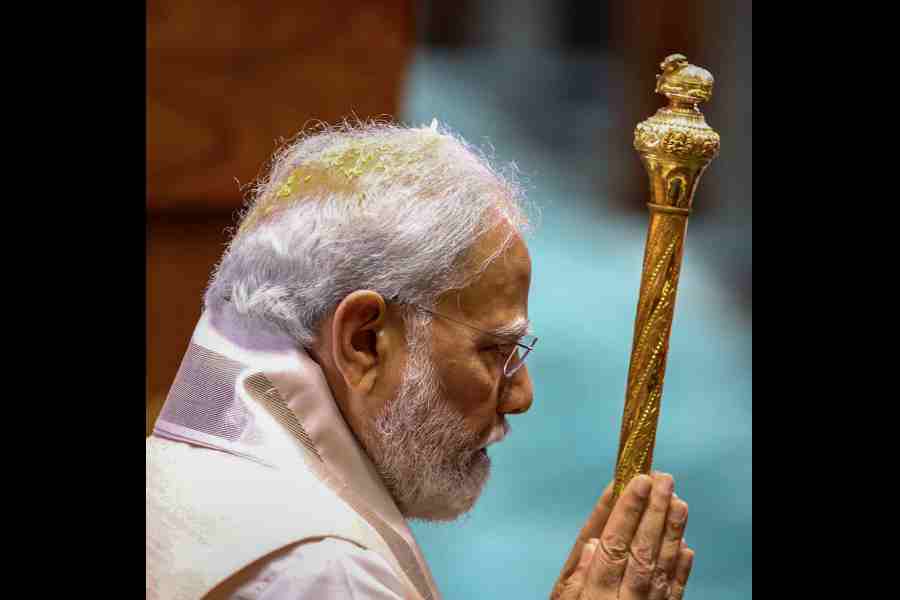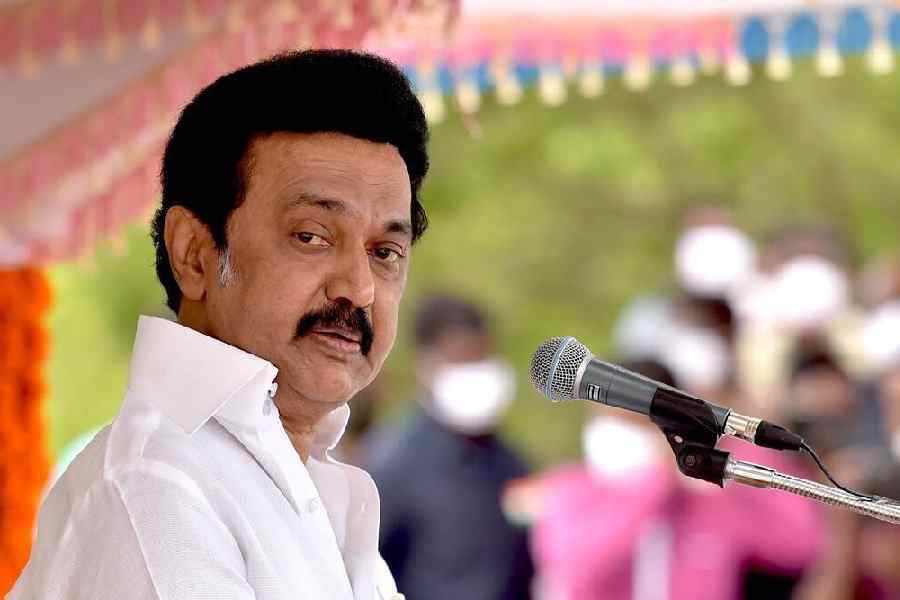What have Kartar Singh Duggal and Ayesha Minhaj got to do with the new Parliament House?
Their story speaks of the choice the Narendra Modi government did not make when it chose to project a sengol (sceptre) with a sketchy history as the symbol of the inauguration of the new Parliament building.
As a symbol of power, the sengol has a questionable role in a republic. But the life and love of Kartar and Ayesha offer many lessons for modern-day India as it again grapples with questions that once shaped its destiny.
On August 14, 1947, around the time the sengol was being handed over to Jawaharlal Nehruat his residence on York Road in New Delhi, less than 5km away at Jantar Mantar, Kartar and Ayesha were embarking on a new journey.
“In the complaisant shadows of a garden near Connaught Circus, Kartar Singh, a journalist and author, celebrated his country’s freedom with an intensely personal gesture,” Dominique Lapierre and Larry Collins write in Freedom at Midnight, describing the first kiss of Kartar and Ayesha, then a medical student.
“The embrace was the first gesture of a long and marvellous love story beginning at a most inauspicious moment. Their particular passion was going to run athwart the passions about to sweep northern India,” the book adds, referencing the Partition riots and the different religions of Kartar and Ayesha.
Sixty years later in 2007, when author and BBC veteran Andrew Whitehead asked Ayesha about that fateful day, the doctor was less dramatic than Lapierre and Collins. The recording of the conversation is available in the archives of London’s School of Oriental and Asian Studies (SOAS).
Ayesha told Whitehead: “We had known for some time each other and we were also corresponding with each other. We had a friendly relationship by then. We just went out for a stroll and we went to Jantar Mantar. It used to be a nice place those days.... Times were so different then.”
Whitehead: “It sounds very romantic being in Jantar Mantar together on the moment of Independence....”
Ayesha: “Yeah, it was. And there weren’t many crowds inside.... We were by ourselves most of the time. Except that the guard was looking at us. But we just overlooked him and continued to be with each other. That’s how we got very close to each other.”
Kartar added: “That evening, we made up our mind to get together... the moment that we took the decision.”
Whitehead pointed out that “your marriage was born on the Independence moment”.
Ayesha responded: “Yeah, yeah it was like that?”
Whitehead then asked her a question that must be playing in the mind of every Indian in contemporary India.
Whitehead: “As a Muslim in Delhi at that time, did you feel frightened?”
Ayesha: “No. You see, in those times, this feeling of being different... the two religions... never occurred to me. Somehow, I had always had friends, I mean non-Muslims, in college. Even at the school level, I had friends who were non-Muslim, one was Sikh, then another was Hindu.... You see, this feeling of alienation was not there. Somehow, we never experienced it. It seems such a change now. All the time, everything you have to see, so, that one is Sikh, this is Muslim. At every step, you come across this. But it was so very different then in those days. At least in the group we moved about.”
Ayesha underscored this point -- the importance of communal harmony in her life -- again during the interview.
Asked if there was any problem within his community because of his relationship with a Muslim and especially since communal divisions were being stirred up then, Kartar said: “No, no. It was the way we were brought up, you know. I didn’t have any communal tinge in my thinking..... I lived with a Muslim family as a paying guest when I was with All India Radio. We used to discuss politics and sometimes tempers were high. They would say ‘why not Pakistan?’ and I would say ‘why not Khalistan? If you can’t trust Hindus, we can’t trust Muslims, you know’. We argued like this. But that was all at the intellectual level.”
Kartar eventually was conferred the Padma Bhushan and was nominated to the Rajya Sabha when I.K. Gujral was Prime Minister. Ayesha graduated as a physician from Delhi’s Lady Hardinge Medical College in 1947.
Kartar was from Rawalpindi and Ayesha from Aligarh. Some of her sisters migrated to Pakistan as their husbands happened to be posted in the government service there when Partition took place.
Kartar told Whitehead: “I was working in All India Radio at Lahore. And I had her elder sister Sultana as one of my colleagues and she was very fond of me…. She suggested why not marry my sister. Well, I didn’t take any notice. I laughed it off because of various considerations. But she persisted.”
Partition brought Kartar to Delhi. Riots raged in the city as Ayesha was completing her studies and staying in a hostel.
“She (Sultana) said: Duggal, you should look after her…. We started meeting. On the eve of August 15… we were together in Connaught Place. Suddenly when gongs, and patriotic songs because India was going to be free the next morning, we decided to marry.”
While he didn’t face much trouble from his family, she did and they eloped. It took a while to calm her anxieties at her home.
Ayesha went on to work in a relief camp in Jalandhar for abducted Muslim women rescued from non-Muslim families by an organisation led by Mridula Sarabhai.
She denied that she was discriminated against for her faith, but hinted that she and her husband did face the heat for their Left-leaning sympathies during the ban on the Communist Party from 1948 to 1952.
“I was given the job knowing that I was a Muslim, knowing that I married a Sikh. That was a known fact, accepted. I lost the job because then they thought that, maybe, because he was also suffering from that impression of the government... In those days the communists were also being persecuted so maybe they thought….
“When we moved to Delhi again I got a job again, worked there for a year or so till they found out about the past report on me and I was again asked to leave,” said Ayesha who eventually retired as a government doctor in the capital.
At one point, Whitehead, whose mastery over the craft of the interview is evident, asked Ayesha: “Did you ever think yourself about settling in Pakistan? Did you ever think about loyalty to Pakistan, rather than to India?”
Ayesha, who had been speaking in a measured tone and choosing her words with care, replied without hesitation: “No. Never. Never ever. Because Pakistan as such.... I didn’t belong to Pakistan. Our family was in UP... in Aligarh. So, we had no attachment to Pakistan.”
One of the most poignant moments -- and lessons -- came into play when Ayesha said that she had been to Lahore a number of times to visit her sisters settled there.
Whitehead: “Do you ever talk to your sisters about who made the right decision, to stay or to go?”
Ayesha: No.... The family had to accept.... There was always that line... that divided us. But it is better to ignore and be practical about it.”
Kartar passed away in 2012, and Ayesha in 2020.
The sengol can never echo the idea of India as the resolve of Kartar and Ayesha at Jantar Mantar did.











